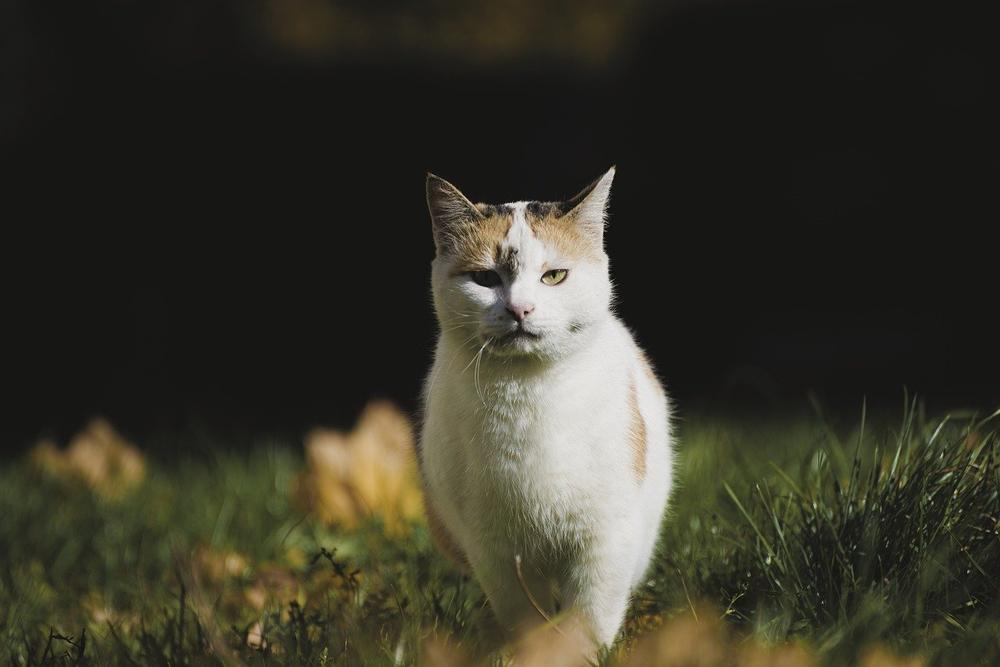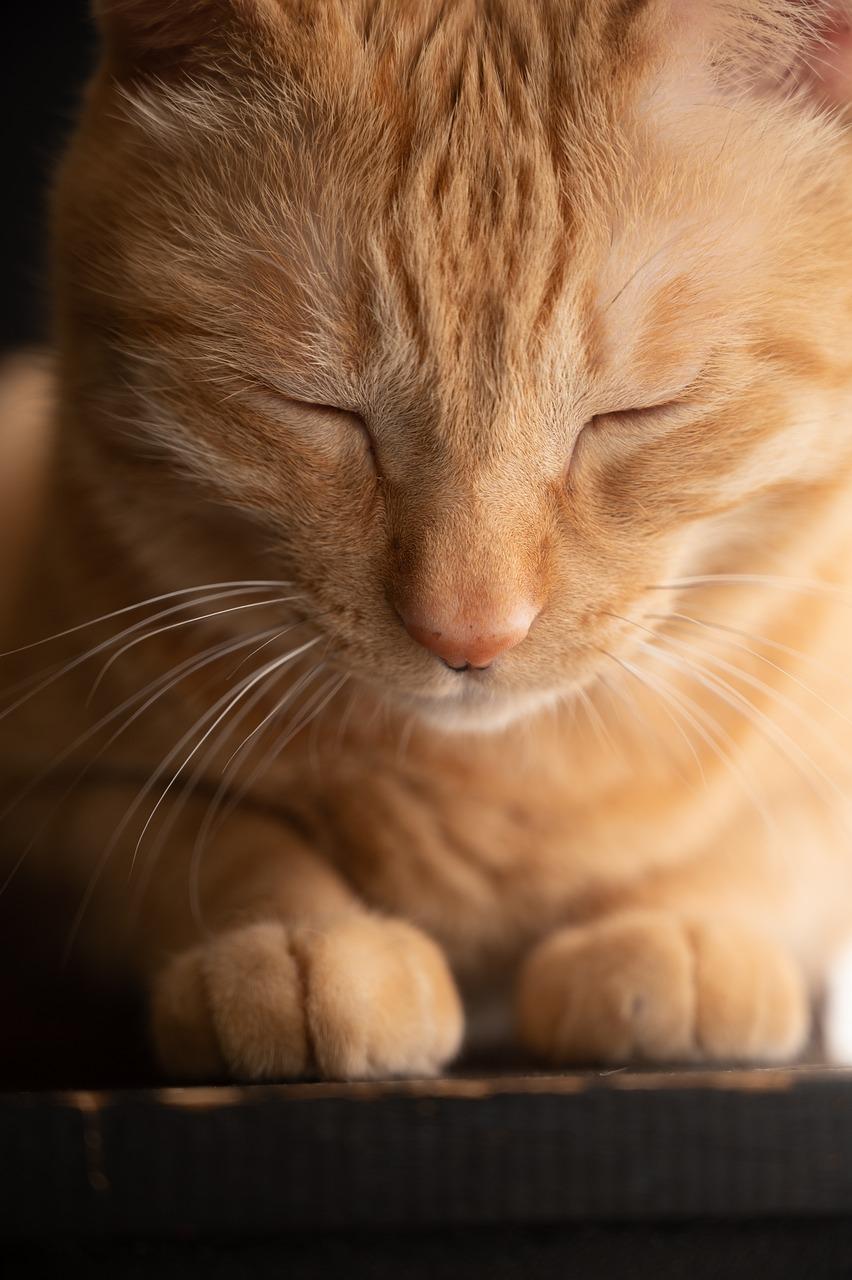Cat Lying With Chin on Floor (Is It Normal Sleeping Position?)

Can I be brutally honest with you?
Imagine this:
Your beloved feline companion, lying on the floor with its chin down, looking helpless and strange. 😿
It's a sight that strikes fear into the hearts of every cat owner.
But don't panic just yet.
In this guide, I'll reveal the truth behind this unusual behavior.
Let's get to the bottom of it, shall we?
Is It Normal for Cats to Sleep with Their Chin on the Floor?
Do cats normally sleep with their chin on the floor?
Yes, it's totally normal for them to do so.

Here's why:
- Cats naturally feel secure and safe when they snooze with their chin touching the floor.
- It's common for playful cats who enjoy stalking toys to adopt this position as a way to unwind.
- They're not necessarily seeking attention by sleeping like this since cats are independent beings even in their slumber.
- However, if your cat suddenly starts choosing the floor as their sleeping spot, it might be a sign that something isn't quite right. Keep an eye out for any other unusual behaviors or signs of illness.
- Sometimes, warmth could be the reason behind a cat's decision to sleep on the floor. Ensure they have access to cool spots and fresh water to help them stay comfortable.
- Watch out for any red flags indicating a serious problem. While snoozing with their chin down is generally nothing to worry about, drastic behavioral changes should be assessed by a veterinarian.
- Remember, cats need a lot of sleep. They typically get around 12 to 16 hours of shut-eye per day. So don't be surprised if you find your furry friend napping in quirky positions!
Rest assured that when you see your cat curled up with their chin on the floor, everything is normal.
Just pay attention to any changes and provide a cozy environment for your feline companion. 😺
And if you do notice your cat exclusively sleeping on the floor, don't panic just yet!
However, you need to pay attention to any other changes in their behavior or signs of illness...
When Should You Be Concerned About Your Cat's Sleeping Position?
If your cat starts sleeping only on the floor, it could mean they want warmth or are feeling unwell.
But, suppose your feline friend abandons their regular sleeping spot and also stops eating or drinking.

In that case, it might be a red flag for a possible problem, and you should consider consulting the vet.
While certain sleeping positions may demand urgent attention, the majority of them are harmless eccentricities.
So, keep an eye on your cat's behavior and ensure they're comfortable, just as any loving pet owner would do.
Signs of Illness to Look for in Your Cat's Sleeping Habits
You need to keep an eye on your cat's sleeping habits because they might be giving you some hints about their health.
Here are 15 signals that you should watch out for:
- If your cat's breathing seems irregular or weak when they're resting.
- If they start sleeping in weird positions, like the meatloaf position. 🐱
- Any changes in their usual sleeping positions.
- When they lie down with their chin on the floor.
- If they press their head against something without rubbing their scent glands.
- When they hide their face while snoozing.
- If they go completely still during deep sleep.
- When their pupils change size noticeably when exposed to light.
- Signs of heatstroke, like excessive panting, drooling, vomiting, a rapid pulse, and increased temperature.
- If they sleep on their side, which could indicate breathing problems or muscle pain.
- Decreased activity levels combined with excessive meowing or yowling.
- Changes in appetite and less enthusiasm for grooming themselves.
- Being extra tired and constantly seeking warmth.
- Any changes in their overall behavior and body language.
- Restlessness and meowing/crying outside of normal sleeping times.
Cats are pretty good at hiding their discomfort, so you should pay attention to these signs.
If you notice anything off, contact a vet right away for the right treatment.

Also, be mindful of injuries and get veterinary help if needed.
But here's the thing you might not realize...
While certain sleeping positions can be normal for cats, others could indicate underlying health issues.
So, how can you tell the difference?
Keep reading to uncover the truth about your cat's sleeping habits and what they could really mean for their well-being...
Understanding the Different Sleeping Positions of Cats
You'll be amazed by how much you can learn from cats' sleeping positions.
Though cats are commonly seen as independent and aloof creatures, the way they sleep tells us a lot about them.
Let me share with you some intriguing facts about cat sleep:
- When cats curl up, it helps them stay warm and keep their vulnerable parts secure.
- If you notice your cat resting its chin on something, it's not just a cute pose; it's actually marking territory using scent glands in its chin.
- Cats lying on their side is a sign that they feel safe and relaxed. It means they trust their surroundings and the people around them.
- Catching your cat snoozing on its back means it feels completely at ease and comfortable. The exposed belly shows vulnerability but also signifies complete trust.
- The fetal position is when cats curl up tightly, protecting their vital organs and staying warm.
Paying attention to your cat's sleep patterns and positions will help you understand its mood and in essence well-being.
If you ever notice sudden changes in their sleep habits or if they avoid certain positions, it might indicate an underlying health issue.
By observing their sleep positions, you can provide better care for your furry friend and ensure their happiness and comfort.
And speaking of cat sleeping positions, have you ever wondered why your feline friend chooses to nap next to their litter box? It's a common behavior that can leave you feeling curious and concerned.
If you're looking for answers, I've written a blog post called "Cat Sleeping Next to a Litter Box" that can provide some insight.
In it, I explore the reasons behind this peculiar behavior and offer guidance on what it might mean for your cat's well-being.
Check it out to learn more and satisfy your curiosity.
Common Sleeping Positions and What They Mean for Your Cat's Health
Here are 10 ways cats sleep and what they might mean:
- If your cat rests its chin on stuff, it's probably claiming its territory.
- When they stretch out their paws while sleeping, it could mean they feel vulnerable from being sick.
- The "cat loaf" position usually means their paws are uncomfortable.
- Sleeping on their back could mean they're either feeling secure or threatened.
- If your cat curls up tightly in a fetal position, it's trying to keep warm but could also be a sign of illness or injury.
- When they curl up with their ears and legs close to their body, it may indicate injury or illness as well.
- Cats lying on the floor with their bellies exposed are usually comfortable and content.
- If your cat sleeps on its side, it's relaxed and feeling at ease.
- When they stretch out with their legs extended, it means they're in a state of relaxation.
- Curling up in a little ball shows that they're protecting themselves.
Understanding how your cat sleeps can tell you about its health and emotions.

Keep an eye out for any changes and consult your vet if necessary.
Decoding Your Cat's Sleeping Habits: A Recap
Key takeaways:
- Cats naturally seek out safe spaces, so it's normal for them to sleep with their chin on the floor.
- If your cat is playful and stalking toys, this behavior is likely normal.
- Sleeping on the floor could be because they're too warm or feeling unwell.
- Watch for any warning signs of a serious issue.
- If your cat starts sleeping on the floor instead of its usual spot and shows signs of not eating or drinking, it may indicate a potential issue.
- Most sleeping positions are harmless quirks, but some may require immediate attention.
- Signs of illness to look for in your cat's sleeping habits include irregular or weak breathing, unusual sleeping positions, pressing the head firmly against something without rubbing scent glands, motionlessness in deep sleep, and changes in pupil size when exposed to light.
- Signs of heatstroke in cats include excessive panting, drooling, vomiting, rapid pulse, and increased temperature.
- Cats' natural instinct to conceal pain or discomfort makes it challenging to recognize sickness.
- Behavioral changes indicating illness or discomfort in cats include alterations in their sleeping routine, seeking company, hiding in dark places, using purring as a form of self-soothing, and displaying unusual aggression or prolonged hiding.
- Different sleeping positions have different meanings, and can indicate different things such as relaxation, vulnerability, or illness.
- Cats sleeping with paws outstretched or in the fetal position may indicate illness or discomfort.
- Sleeping on the floor with the belly exposed usually indicates comfort, while sleeping on the side signifies relaxation.
And that wraps up today's article.
If you wish to read more of my useful articles, I recommend you check out some of these: Cat Poops on Floor When Angry, Cat Growling After Giving Birth, How Do Cats Clean Themselves After Pooping, How to Keep Cats From Pooping in House Plants, and How to Find a Lost Cat in Winter
Talk soon,
-Sarah Davis